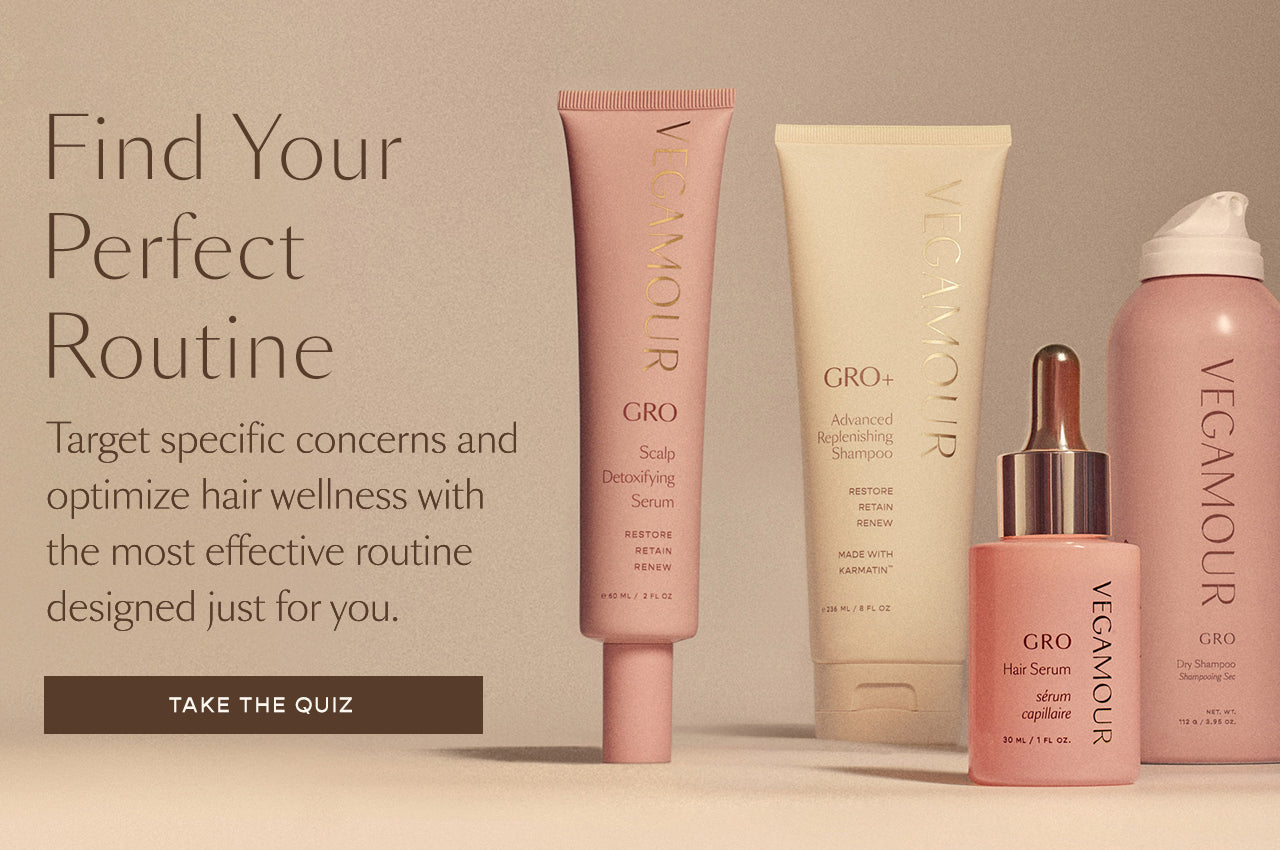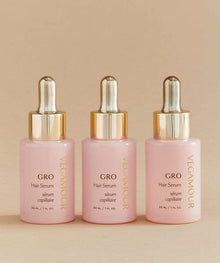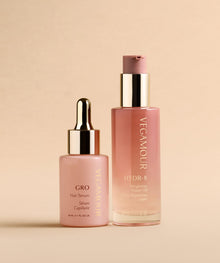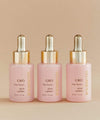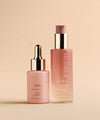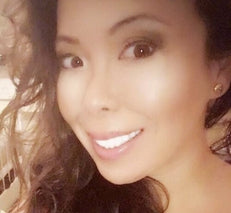Does Dandruff Cause Hair Loss? A Dermatologist Explains
Picture this: You’re about to head out, and you notice some rogue strands of hair and telltale white flakes dusting your shoulders — and, no, it’s not snowing. If you’re scratching your head — literally — on whether there’s a link between dandruff and hair loss, read on. Plus, learn more about the best products you can use to ease your dandruff.
Does Dandruff Cause Hair Loss?
Before we get to the culprit behind dandruff, let’s explore whether the skin condition is actually harmful to your immune system or hair health and if it contributes to hair loss. While dandruff is super common — in fact, approximately 50% of people will experience the issue in their lives — it likely won't lead to hair loss, nor is it a main cause behind thinning hair.
Getting to the Root of Dandruff
Dandruff, along with its more serious form — seborrheic dermatitis — are skin conditions that can cause flakes to fall from the scalp. No need to be embarrassed: Having dandruff and seborrheic dermatitis aren't a reflection of your hygiene habits.
Dry scalp and dandruff aren't the same. Rather, dandruff is a reaction resulting from the yeast on the scalp. While this yeast is found on the scalp of all people, for some, it can result in yeast overgrowth or fungal infections. These can cause itching, dryness and inflammation of the scalp and hair follicles, along with the flaking skin that results in those pesky white flakes.
Most important to remember: There is little to no scientific evidence to connect dandruff and hair loss.
Related: You Should Moisturize Your Scalp — Here's How
Dandruff Versus Seborrheic Dermatitis: What’s the Difference?
“Dandruff is quite common,” said Michelle Henry, M.D. FAAD, Skin & Aesthetic Surgery of Manhattan. “The difference between seborrheic dermatitis and common dandruff is the level of discomfort.” Inflammation is another big difference between seborrheic dermatitis and common dandruff.
While dandruff can be a visible nuisance, the symptoms of an itchy and/or dry scalp, which create flaking, are typically milder than those experienced with seborrheic dermatitis. In seborrheic dermatitis, stubborn dandruff is present, along with scaly patches and red skin that can also affect oil production in other areas of the body, including the face, sides of the nose, eyebrows, ears, eyelids and chest.
Also: Doctors Explain Why Your Scalp and Hair Hurt
What Dandruff Does and Doesn't Do
The good news is that dandruff causing hair loss is a myth — it can, however, impact hair growth and hair regrowth, depending on the severity of the condition, along with scalp health.
Other conditions that can impact scalp health include:
- Scalp psoriasis, which is a skin condition that results in raised, reddish, often scaly patches.
- Lichen planopilaris, which causes temporary hair loss when fungus destroys the hair follicle and replaces it with scarring.
- Tinea capitis, also known as scalp ringworm, can cause hair loss; dry, scaly areas; redness and itch.
- Tinea barbae is essentially the same condition as tinea capitis but involves the beard area with pattern baldness.
- Malassezia fungus can cause inflammation, damaging the hair follicles and causing hair loss if produced in excess and left untreated.
If you're worried your scalp issues go beyond dandruff, it's best to see your dermatologist or trichologist for a diagnosis.
Doctor's Orders
Dandruff is not directly physically harmful to health, nor is it proven to cause temporary hair loss, but it can factor into other areas of your life.
"While it may not affect your overall health, it can affect your quality of life and mental health ... if it's significant. It can be hard to explain to people why you're leaving hair all over your desk or to an intimate partner that you washed your hair, [and] it's not dirty, it's dandruff," said Dr. Henry. "And, it can affect your sleep depending on how itchy it is. All those reasons are strong reasons why we treat it and take it seriously."
The colder winter months, when there's less hydration all-around, are when the dermatologist sees more cases of dandruff. As for the causes of those nagging white flakes? It's up for debate.
"There is a lot of controversy as to what causes dandruff. Some think dandruff may be a mild case of seborrheic dermatitis, but it's not inflammatory," said Dr. Henry. "Could it be gentle, mild irritation from products or something that's genetic? Maybe, we're not sure. For something that affects 50% of the population and is really, really common, there's still a bit of debate as to what exactly does cause it."
Defeat Dandruff Before It Defeats You
The dermatologist recommends a number of ways to treat and prevent the issue before it spirals out of control. First, consider using hair care products designed with dandruff in mind, such as anti-dandruff shampoo. Dr. Henry recommends using a dandruff shampoo with ingredients like zinc pyrithione or coal tar, which can help break up scaly skin.
Read: How to Exfoliate Your Scalp
Treat Your Scalp to a Massage and Quality Products
"If it gets beyond what a shampoo can handle, I will recommend a scalp exfoliator," said Dr. Henry. "There's been this conversation about the "signification" of haircare. And so using moisturizers on the scalp like oils like jojoba and argan; while I don't love coconut oil on the body, I love it on the scalp. These are all really great oils to hydrate the scalp and lock in moisture."
Opt to try a scalp massager to boost circulation in and around the scalp and hair follicles. Or, consider products such as GRO Scalp Detoxifying Serum, which can reduce sebum production and dandruff-causing fungi. This serum gently removes buildup, soothes irritation and restores balance to the scalp.
Rx to Soothe the Scalp
If your scalp issue is beyond dandruff and seborrheic dermatitis, the doctor recommends heading to your health care provider for professional treatment.
"If someone has thick, super white, adherent scale that looks like oyster shell, it could be psoriasis which also needs medical intervention," said Dr. Henry.
For this and other yeast or fungal-related skin conditions, it may be necessary to use both antifungal shampoo and topical medications. According to The American Academy of Dermatology, using dandruff shampoo and scalp treatments are the most effective ways to control the issue.
Shop: GRO Scalp Detoxifying Serum
Lather Up
When dealing with dandruff, continual treatment is necessary, as it is usually a chronic issue. For those with a mild case of dandruff, begin by washing hair daily to prevent the buildup of oils and skin cells. When opting for a medicated shampoo, look for the following active ingredients:
- Coal tar shampoo decreases the number and size of skin cells; this leads to a reduction in how often these cells die and flake off.
- Ketoconazole shampoo is an antifungal that kills the fungus on the scalp that causes dandruff. It's available over the counter or in a stronger prescription version; it's typically used only twice a week and requires 5-10 minutes on the scalp.
- Salicylic acid shampoo loosens flakes and washes them away to eliminate scaling or flaking.
- Selenium sulfide shampoo includes an antifungal that combats Malassezia fungus.
- Tea tree oil shampoo can be an effective treatment for dandruff due to its antifungal properties.
- Zinc pyrithione shampoo treats fungal infections and includes antibacterial ingredients.
- Apple cider vinegar, when used as a hair rinse, has been shown to have a level of acid content that decreases itching, flaking and calms down the inflammatory reactions to yeast or fungal overgrowth.
Set Up Your Tresses for Success
Now that you know that dandruff won't likely lead to hair loss, you can relax. But that doesn't mean you shouldn't do a little extra for your hair and scalp. Bolster your overall health and hair wellness by incorporating scalp massage, exfoliation and targeted supplements into your regular routine. And if those unwanted white flakes do appear, you can combat them with a dandruff shampoo. If you find that anti-dandruff shampoo is too harsh for your tresses, consider washing with a revitalizing shampoo every other wash to give your scalp and hair a break.
If your issues get worse or become troublesome, however, always consult with your doctor.
More From VEGAMOUR
Photo credit: Sam Lion/Pexels
